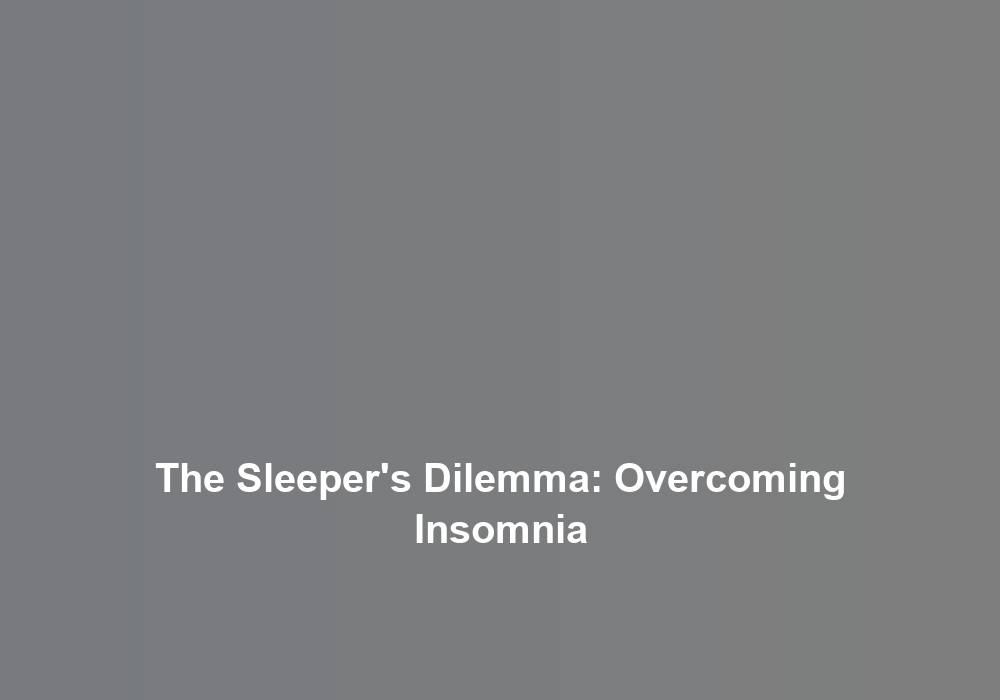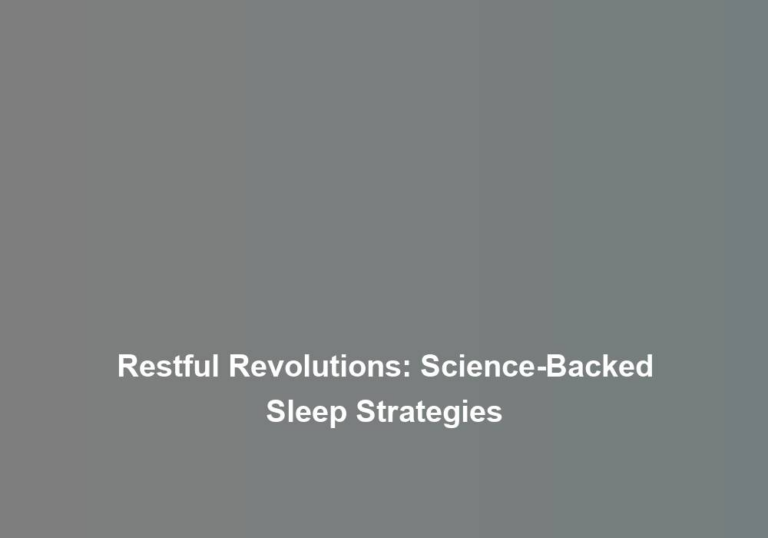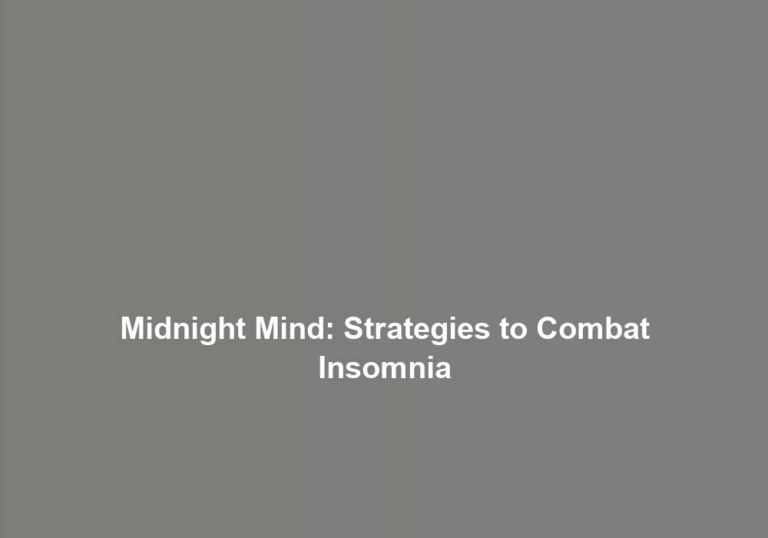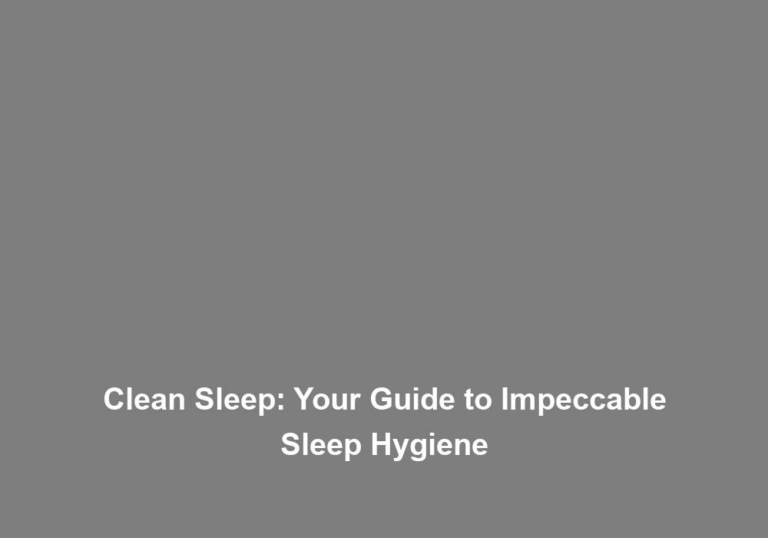The Sleeper’s Dilemma: Overcoming Insomnia
So, youG??re a pro at staring at the ceiling at 3 a.m., huh? The struggle of insomnia is all too real, but fear not, there might just be a glimmer of hope in the horizon. Imagine finally being able to drift off into dreamland without tossing and turning for hours on end. ItG??s not just a dreamG??itG??s a possibility. Stay with me, and letG??s explore some effective strategies to kiss those sleepless nights goodbye.
Understanding Insomnia: Causes and Triggers
Understanding the causes and triggers of insomnia can help you identify the factors contributing to your sleep difficulties. Identifying patterns in your daily routine, stress levels, and emotional state can provide valuable insight into what might be keeping you awake at night. By recognizing these patterns, you can start to pinpoint specific triggers that may be exacerbating your insomnia. For example, noticing that you have trouble sleeping on nights when you consume caffeine or alcohol, or when youG??re feeling particularly stressed, can help you make targeted changes to improve your sleep.
In addition to identifying patterns, cognitive behavioral techniques can be instrumental in addressing insomnia. These techniques focus on changing negative thought patterns and behaviors that can contribute to sleep difficulties. By learning to challenge and reframe negative thoughts about sleep, you can reduce the anxiety and worry that often accompany insomnia, making it easier to fall and stay asleep. Cognitive behavioral techniques also include establishing a regular sleep schedule, creating a relaxing bedtime routine, and practicing relaxation techniques to help calm the mind and body before sleep.
The Impact of Insomnia on Health
If you struggle with insomnia, the impact it can have on your overall health and well-being is significant. Poor sleep quality can lead to a range of health issues, including weakened immune function, increased risk of chronic conditions such as heart disease and diabetes, and cognitive impairment. Sleep hygiene, which refers to practices and habits that promote good sleep, is crucial in managing the impact of insomnia on your health. Simple adjustments such as maintaining a consistent sleep schedule, creating a comfortable sleep environment, and limiting exposure to screens before bedtime can make a notable difference in your sleep quality and overall health.
Furthermore, cognitive therapy has been shown to be effective in addressing the health impact of insomnia. This type of therapy can help you identify and change thoughts and behaviors that contribute to sleep problems. By addressing underlying anxieties and stressors that may be keeping you awake at night, cognitive therapy can improve your ability to fall and stay asleep, ultimately benefiting your health.
ItG??s important to recognize that the impact of insomnia on your health is not just physical. Chronic sleep deprivation can also take a toll on your mental and emotional well-being, leading to increased irritability, mood disturbances, and difficulty concentrating. Seeking support and guidance to address insomnia through interventions like cognitive therapy can significantly improve your overall health and quality of life.
Effective Lifestyle Changes for Better Sleep
To improve your sleep quality and overall health, implementing effective lifestyle changes is essential. Your sleep environment plays a significant role in the quality of your sleep. Make sure your bedroom is dark, quiet, and at a comfortable temperature. Consider using blackout curtains, earplugs, or a white noise machine to create an optimal sleep environment. Additionally, invest in a comfortable mattress and pillows that support your body well.
Furthermore, establishing a consistent daily routine can greatly impact your ability to fall asleep and stay asleep. Try to wake up and go to bed at the same time every day, even on weekends. This helps regulate your bodyG??s internal clock, making it easier to fall asleep at night. Incorporating regular exercise into your daily routine can also promote better sleep. However, ensure that you complete your workout at least a few hours before bedtime to allow your body to wind down.
Moreover, be mindful of your activities before bedtime. Avoid consuming caffeine or heavy meals close to bedtime, as these can disrupt your sleep. Instead, opt for a light snack if youG??re hungry. Lastly, limit screen time before bed, as the blue light emitted from electronic devices can interfere with your bodyG??s natural sleep-wake cycle. By making these lifestyle changes, you can create an environment and routine that supports restful and rejuvenating sleep.
Techniques for Relaxation and Stress Reduction
Consider incorporating relaxation techniques such as deep breathing and progressive muscle relaxation into your daily routine to help reduce stress and promote better sleep. These techniques can be powerful tools in managing stress and anxiety, ultimately leading to improved sleep quality. Here are some simple yet effective relaxation techniques that you can easily incorporate into your daily routine:
| Relaxation Technique | Description | Benefits |
|---|---|---|
| Mindfulness meditation | Involves focusing on the present moment and calmly acknowledging and accepting oneG??s feelings. | Reduces stress and enhances self-awareness. |
| Deep breathing exercises | Involves deep, slow, and rhythmic breathing to relax the body and calm the mind. | Lowers heart rate and promotes relaxation. |
| Progressive muscle relaxation | Involves tensing and then relaxing each muscle group in the body. | Reduces muscle tension and promotes relaxation. |
Mindfulness meditation encourages you to be present in the moment, reducing the tendency to dwell on the past or worry about the future. Deep breathing exercises can help calm your mind and relax your body, making it easier to fall asleep. Progressive muscle relaxation is a systematic technique that promotes physical relaxation, which can help alleviate the tension built up from daily stress. By incorporating these relaxation techniques into your daily routine, you can create a more peaceful and stress-free environment, ultimately promoting better sleep and overall well-being.
Seeking Professional Help for Insomnia
You can benefit from seeking professional help for insomnia, as it may provide effective strategies for improving your sleep. When you find it challenging to manage your insomnia on your own, reaching out to a healthcare professional can offer valuable support and guidance. One of the most common and effective treatments for insomnia is cognitive behavioral therapy (CBT). This form of therapy focuses on identifying and changing negative thoughts and behaviors that may be contributing to your sleep problems. Through CBT, you can learn practical techniques to improve your sleep, such as establishing a regular sleep schedule, reducing stimuli before bedtime, and managing racing thoughts that keep you awake at night.
In some cases, your healthcare provider may also recommend prescription medication to help you manage your insomnia. Medications can be a useful short-term solution to help you get the rest you need while working on long-term strategies to improve your sleep. ItG??s important to work closely with your healthcare provider to find the right medication and dosage that suits your individual needs. They can also monitor your progress and make adjustments as necessary to ensure the best possible outcome.
Conclusion
So, next time you find yourself tossing and turning in bed, remember that overcoming insomnia is like taming a wild horse. It takes patience, persistence, and gentle guidance. Just as a skilled horse trainer can calm a restless horse, with the right techniques and support, you can conquer your insomnia and enjoy restful nights once again. DonG??t give up, keep working on it, and soon youG??ll be riding the waves of peaceful sleep.







